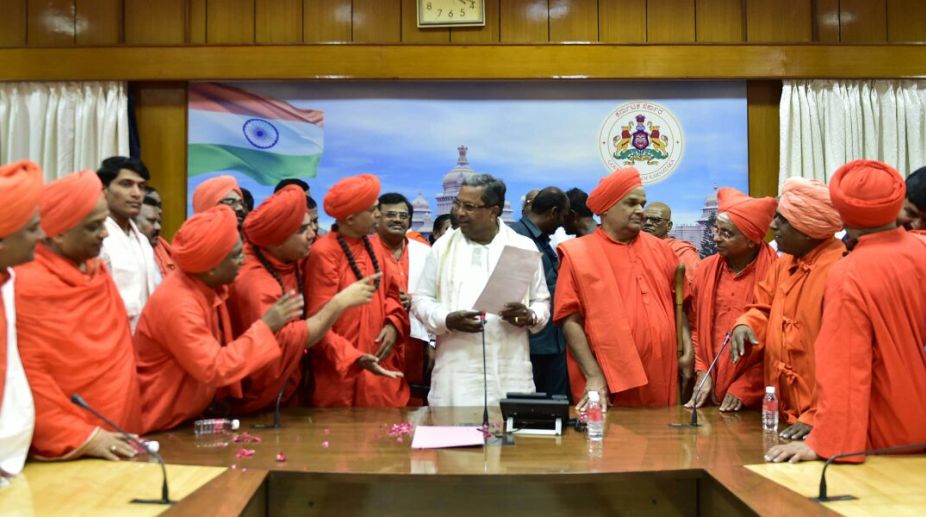High-stakes contests in Karnataka
The southern State of Karnataka is preparing for the upcoming Lok Sabha elections, a momentous event. It will unfold in 28 constituencies over two phases on April 26 and May 7.

Lingayat seers meet Siddaramaiah. (Photo: Twitter/@CMofKarnataka)
Last Monday’s decision of the Karnataka Cabinet, based on the recommendation of the State Minority Commission, according religious minority status to Veerasaivas, popularly known as Lingayats, is unlikely to have a significant bearing on the outcome of the State Assembly election due in two months.
On the face of it, the decision may seem a blow to BS Yeddyurappa, the BJP’s Chief Minister candidate and leader of the Lingayat community.
On the issue of a separate religious tag for the community, he is on the same side as Congress Chief Minister Siddaramaiah.
Advertisement
The Lingayats’ flirtation with the BJP began only after LK Advani’s rath yatra to Ayodhya in the 1990s to whip up support for the construction of a Ram temple there.
The Veerasaivas, founded by a Brahmin named Basavanna in the 12th century, emerged as a separate religion like Buddhism, Jainism and Sikhism.
They rejected the tenets of traditional Hinduism like karma, ritualism and caste and emphasised the necessity as well as the dignity of labour.
Veerasaivasim attracted converts from all castes, including Dalits. The new religion follows the teachings of Basavanna based on a rigid doctrine of monotheism. Siva is regarded as the supreme transcendent entity.
Over the centuries the Veerasaivas became an endogamous community called Lingayats, distinguished by the Sivalinga and rudraksa on their person.
Basavanna’s verses or vachanas became their Bible and they consider Hindu ritualism as a corruption of their faith. The census reports during colonial rule clubbed the Veerasaivas with the Hindus without understanding the distinction.
The demand to accord independent religious status with minority rights began almost a century ago but it gained momentum only in recent years.
Lingayats belonging to all parties, including Yeddyurappa of the BJP, petitioned the Union government in 2013 demanding Veerasaivas to be enumerated as followers of a separate religion.
The Lingayats account for 19 per cent of Karnataka’s population. Spread out mostly in north Karnataka, they could influence voting in 70 to 80 Assembly constituencies out of the 224.
The BJP views the decision of the Siddaramaiah government as a ploy to split the Lingayat votes. Vokkaligas and the Lingayats are the two politically dominant communities in Karnataka.
SM Krishna, long time Congress leader and former Chief Minister, a Vokkaliga, was won over to the BJP by the Narendra Modi-Amit Shah duo, tilting the balance in favour of the ruling party at the Centre.
Whether to accept or not the Karnataka government’s decision on Lingayats and notify it under Section 2(c) of the Central Minority Commission Act is entirely up to Prime Minister Narendra Modi.
If the Centre fails to ratify the Karnataka resolution, the Lingayats, at least the younger generation, could turn against the BJP.
Advertisement